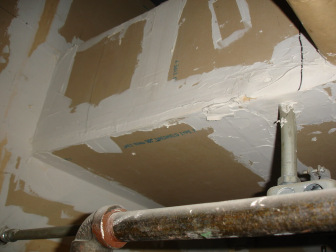
Sean Fitzgerald, PG, is a research geologist specializing in asbestos environmental studies.
Bondex International manufactured products with asbestos from the 1960s until the late 1970s. RPM Inc. established the Bondex asbestos trust in 2016 to compensate claimants with an illness caused by asbestos exposure through Bondex products. The current payout percentage is 29.5%.


Bondex manufactured a range of asbestos-containing products between 1961 and 1977. The brand started in 1959, making products such as joint compounds, roofing cement and paints for the construction industry and home building and repair projects.
Asbestos was a favored material because of its strength, durability and resistance to heat. These characteristics were useful in building materials to prevent fires and other accidents. The Bondex brand started small but soon became popular with homeowners and contractors.
The success of the Bondex brand garnered notice by other names in the industry. Republic Powdered Metals (RPM Inc.), known for manufacturing protective coatings, purchased Reardon Company, the parent company of Bondex, in 1966. RPM Inc. continued to acquire other companies that used asbestos, such as DAP Products Inc. and Rust-Oleum Corporation.
Lawsuits citing asbestos exposure claims against Bondex began in the 1980s and continued until the company filed for bankruptcy in 2010. Decades of using asbestos in its products put Bondex workers and consumers in danger of exposure, resulting in tens of thousands of claims.
RPM Inc. established the Bondex Trust in 2016 after thousands of asbestos claims made it impossible for the company to keep up with its financial liabilities. Until 2003, the claims were scarce and the amounts were low enough that RPM Inc. managed to cover most through its insurance policy.
When this resource was exhausted, the company continued to face increasing costs for asbestos claims, and eventually, it could not handle the financial burden of the thousands of lawsuits. Following suit with many other companies that used asbestos, RPM Inc. decided to file for Chapter 11 bankruptcy in 2010, establishing the trust in 2016 as part of its reorganization plan.
The purpose of the trust is to provide compensation to current and future claimants who developed asbestos-related diseases from exposure to Bondex products. With the creation of the trust, RPM Inc. was no longer liable for asbestos claims.
The Settlors hereby create a trust known as the ‘Specialty Products Holding Corp., Bondex International, Inc., Republic Powdered Metals, Inc. and NIMBFiL, Inc. Asbestos Personal Injury Trust,’ which is the Asbestos Trust provided for and referred to in the plan.
The Bondex asbestos trust fund initially had $797.5 million in funds. As with all asbestos trust funds, payments to claimants have a cap at a certain percentage to ensure adequate funds remain for future patients who develop mesothelioma cancer and other diseases from exposure to asbestos fibers through their employment with Bondex International. The current payment percentage for the Bondex Trust is 29.5%.
Claimants can choose between expedited review or individual review. Those who opt for expedited review typically receive the standard percentage payout. Individual claims take longer to review but may result in a higher payout. Claimants can file online or submit a paper claim with documentation of their diagnosis and exposure history.

You shouldn’t have to choose between getting care and paying for it. Get the financial support you deserve.
See My OptionsNumerous occupations in asbestos products manufacturing, mining and abatement put workers in danger of asbestos exposure. People who worked in jobs that handled raw asbestos materials to create Bondex products were at risk. Others who worked in occupations that used the finished materials were also at risk. Although many companies like Bondex were aware of the dangers of asbestos exposure, they did not inform their workers or take necessary safety precautions to protect them.
Occupational asbestos exposure is the most frequent cause of mesothelioma and other asbestos-related diseases. However, close family members of workers dealing with Bondex products were also in danger of developing an illness from secondary exposure.
Workers brought asbestos fibers home on their clothing, skin and hair. Family members became exposed through normal chores such as handling and laundering contaminated clothing or sharing a hug with a loved one covered in asbestos fibers.
Bondex manufactured asbestos-containing products for home DIY projects and contractors through the 1970s. The brand produced popular products from surface preparation and wallpapering to masonry.
The range of products manufactured for building projects of all sizes were favorites among professionals and homeowners. The prevalence of these products placed many workers, DIY homeowners and their families at risk of asbestos exposure. Despite knowing the harm asbestos causes, Bondex opted to continue using the material.
In 1977 and 1978, new regulations banned asbestos-containing wall patching compounds and spray-applied surfacing materials from the U.S. market. Bondex requested an extension for its recalled products, claiming the action would cause serious financial problems.
Most of the asbestos lawsuits filed against RPM Inc. cite Reardon Company’s Bondex products as the cause of exposure. The company paid a total of $1.6 million from 1980 through 1999, but the number of lawsuits began significantly increasing in 2000. From this time until its 2010 bankruptcy proceedings stopped its asbestos liabilities, RPM Inc. paid out millions in damages.
The Bondex asbestos trust continues to pay claims for those who received a diagnosis of mesothelioma or another asbestos-related disease because of exposure to Bondex products. Claimants can seek compensation through an experienced asbestos attorney who specializes in asbestos trust fund claims. An asbestos lawyer can help you gather the necessary documentation to secure compensation to pay for medical expenses and other damages.
Recommended ReadingStay up-to-date on treatment, research, clinical trials, doctors and survivors
The information on this website is proprietary and protected. It is not a substitute for professional medical advice, diagnosis or treatment. Any unauthorized or illegal use, copying or dissemination will be prosecuted. Please read our privacy policy and terms of service for more information about our website.
This website and its content may be deemed attorney advertising. Prior results do not predict a similar outcome.
The Mesothelioma Center’s claim as the most trusted resource is based on our more than 150 5-star Google and BBB reviews. Our organization also helps more than half of all mesothelioma patients annually diagnosed.
Your web browser is no longer supported by Microsoft. Update your browser for more security, speed and compatibility.
If you are looking for mesothelioma support, please contact our Patient Advocates at (855) 404-4592
The Mesothelioma Center at Asbestos.com has provided patients and their loved ones the most updated and reliable information on mesothelioma and asbestos exposure since 2006.
Our team of Patient Advocates includes a medical doctor, a registered nurse, health services administrators, veterans, VA-accredited Claims Agents, an oncology patient navigator and hospice care expert. Their combined expertise means we help any mesothelioma patient or loved one through every step of their cancer journey.
More than 30 contributors, including mesothelioma doctors, survivors, health care professionals and other experts, have peer-reviewed our website and written unique research-driven articles to ensure you get the highest-quality medical and health information.
My family has only the highest compliment for the assistance and support that we received from The Mesothelioma Center. This is a staff of compassionate and knowledgeable individuals who respect what your family is experiencing and who go the extra mile to make an unfortunate diagnosis less stressful. Information and assistance were provided by The Mesothelioma Center at no cost to our family.LashawnMesothelioma patient’s daughter


Asbestos.com. (2025, September 16). Bondex International. Retrieved December 19, 2025, from https://www.asbestos.com/companies/bondex-international/
"Bondex International." Asbestos.com, 16 Sep 2025, https://www.asbestos.com/companies/bondex-international/.
Asbestos.com. "Bondex International." Last modified September 16, 2025. https://www.asbestos.com/companies/bondex-international/.
An occupational scientist or another expert who specializes in occupational hazards reviewed the content on this page to ensure it meets current scientific standards and accuracy.

Sean Fitzgerald, PG, is a research geologist specializing in asbestos environmental studies.
Our fact-checking process begins with a thorough review of all sources to ensure they are high quality. Then we cross-check the facts with original medical or scientific reports published by those sources, or we validate the facts with reputable news organizations, medical and scientific experts and other health experts. Each page includes all sources for full transparency.
Please read our editorial guidelines to learn more about our content creation and review process.
